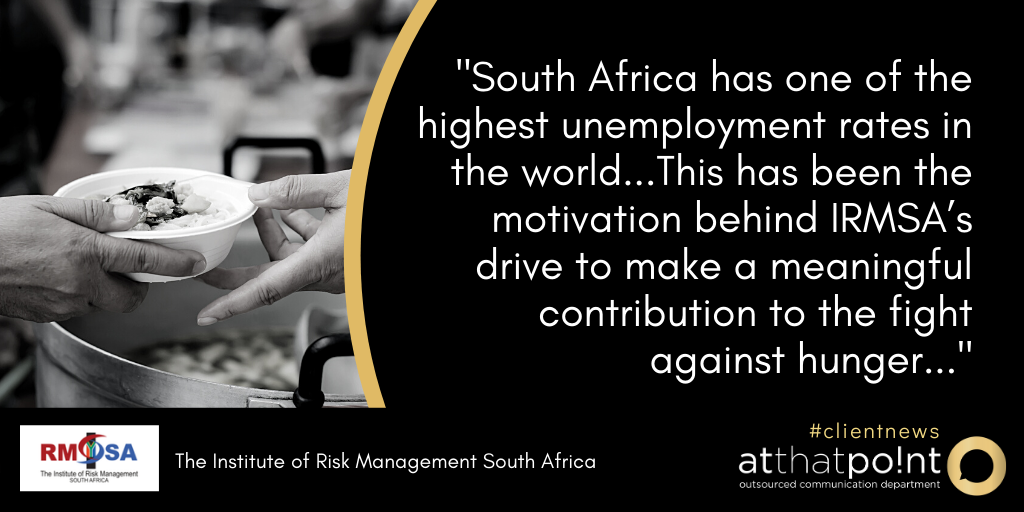 South Africa has one of the highest unemployment rates in the world, with many being unable to provide for their families. This has been the motivation behind The Institute of Risk Management South Africa’s (IRMSA’s) drive to make a meaningful contribution to the fight against hunger and food scarcity. The institute has indicated that it realised the risk that food insecurity poses to the South African business landscape and felt responsible to be part of the solution. Choosing a food champion On World Food Day earlier this month the impact of Covid-19 and the emerging risk of food scarcity were driven home more profoundly than ever before, says IRMSA. The institute, together with nine other organisations including the Institute of Directors South Africa (IoDSA), the Association of Certified Fraud Examiners South Africa (ACFESA), the Corporate Counsel Association of South Africa (CCASA), the Compliance Institute of Southern Africa (CISA), and the Financial Planning Institute (FPI), have continued with their relationship with FoodForward SA as their champion to collect, store, preserve, package and distribute meals to the vulnerable during this time. Millions are food insecure Judging from the number of people that have become unemployed in the first and second quarters, FoodForward SA estimates that 30 million people are food insecure. This means they are not getting regular access to safe and nutritious food. “There are no easy fixes to the current threats posed by poverty, unemployment and structural inequality. Food is foundational for the rest of the country to work well,” says Andy Du Plessis, Managing Director at FoodForward SA. FoodForward SA is involved in recovering edible surplus food from the consumer goods supply chain and distributing it to registered community organisations that serve the poor. “I believe that our food banking model – recovering good quality edible surplus food from the supply chain is the most cost-effective way to address food insecurity.” Good supply chains Du Plessis warns that the country is in a food security crisis like never before. “It is not that South Africa does not have enough food. We do. However, the allocation and access of food is inequitable because of poverty dynamics.” He says SA has a net surplus of food, but most of it is lost or wasted because of weaknesses in the supply chain. FoodForward SA has since it was established in 2009 secured a sophisticated supply chain based on the collaboration of numerous partners. Distribution during Covid-19 During the previous financial year FoodForward SA distributed 5,115 tons of food which represents 20 million meals. In the past six months, directly because of the Covid-19 pandemic, the organisation has distributed 5,500 tons of food or the equivalent of 22 million meals. Du Plessis notes that they were operating in only six provinces before the coronavirus started spreading in SA. “We are now operating in all nine provinces as we make sure better access to food is realised,” he adds. Bedrock of food security The scourge of farm attacks and brutal murders has become a huge risk to food production in SA. “Farmers are the bedrock of our food security. If we disrupt this, the economic impact will be catastrophic.” Du Plessis says Zimbabwe is a prime example. “If we become a net importer of what we currently grow, food prices will skyrocket, and food insecurity will deepen severely,” he warns. ENDS MEDIA CONTACT: Idele Prinsloo, 082 573 9219, [email protected], www.atthatpoint.co.za For more information on IRMSA please visit: Website: https://www.irmsa.org.za/ Twitter: https://twitter.com/IRMSAInsight Facebook: https://www.facebook.com/IRMSAInsight/?ref=hl LinkedIn: https://www.linkedin.com/company/irmsa-institute-of-risk-management-sa/
0 Comments
|
Welcome to the IRMSA Newsroom
Archives
December 2020
Categories
All
|

 RSS Feed
RSS Feed